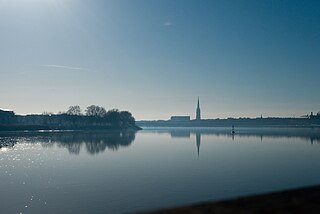
The Garonne is a river that flows in southwest France and northern Spain. It flows from the central Spanish Pyrenees to the Gironde estuary at the French port of Bordeaux – a length of 529 km (329 mi), of which 47 km (29 mi) is in Spain ; the total length extends to 602 km (374 mi) if one includes the Gironde estuary between the river and the sea. Its basin area is 56,000 km2 (22,000 sq mi), which increases to 84,811 km2 (32,746 sq mi) if the Dordogne River, which flows from the east and joins the Garonne at Bec d'Ambès to form the Gironde estuary, is included.

Toulouse is the prefecture of the French department of Haute-Garonne and of the larger region of Occitania. The city is on the banks of the River Garonne, 150 kilometres from the Mediterranean Sea, 230 km (143 mi) from the Atlantic Ocean and 680 km (420 mi) from Paris. It is the fourth-largest city in France after Paris, Marseille and Lyon, with 504,078 inhabitants within its municipal boundaries (2021); its metropolitan area has a population of 1.5 million inhabitants (2021). Toulouse is the central city of one of the 22 metropolitan councils of France. Between the 2014 and 2020 censuses, its metropolitan area was the third fastest growing among metropolitan areas larger than 500,000 inhabitants in France.
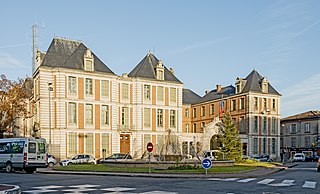
Tarn-et-Garonne is a department in the Occitania region in Southern France. It is traversed by the rivers Tarn and Garonne, from which it takes its name. The area was originally part of the former provinces of Quercy and Languedoc. The department was created in 1808 under Napoleon, with territory taken from the neighbouring Lot, Haute-Garonne, Lot-et-Garonne, Gers and Aveyron departments.

The commune of Agen is the prefecture of the Lot-et-Garonne department in Nouvelle-Aquitaine, southwestern France. It lies on the river Garonne 135 kilometres southeast of Bordeaux.

Henri-Jean Guillaume "Henri" Martin was a French painter. Elected to the Académie des Beaux-Arts in 1917, he has been described as a prolific master whose work has touches of melancholy, dreaminess and mystery.

Henri Brémond was a French literary scholar and philosopher, Catholic priest, and sometime Jesuit. He was one of the theological modernists.
Bernard Heidsieck was a French sound poet, associated with various movements throughout a long career: including Beat, American Fluxus, and minimalism.

André Salmon was a French poet, art critic and writer. He was one of the early defenders of Cubism, with Guillaume Apollinaire and Maurice Raynal.

Philippe Jaccottet was a Swiss Francophone poet and translator.
Pierre Bec was a French Occitan-language poet and linguist. Born in Paris, he spent his childhood in Comminges, where he learnt Occitan. He was deported to Germany between 1943 and 1945. After returning, he studied in Paris, where he graduated in 1959. He was one of the founders of the IEO or Institut d'Estudis Occitans as well as its president from 1962 to 1980.

Linda Maria Baros is a French-language poet, translator and literary critic, one of the most powerful new voices on today's poetry scene . She lives in Paris, France.
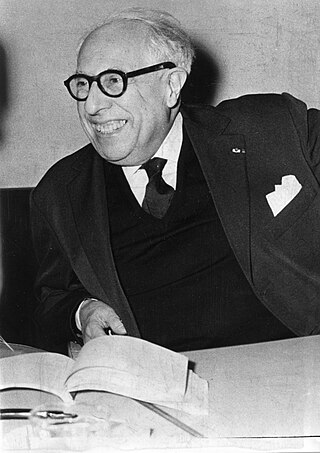
Jean Cassou was a French writer, art critic, poet, member of the French Resistance during World War II and the first Director of the Musée national d'Art moderne in Paris.

Pierre Gamarra was a French poet, novelist and literary critic, a long-time chief editor and director of the literary magazine Europe.
Gamarra is best known for his poems and novels for the youth and for narrative and poetical works deeply rooted in his native region of Midi-Pyrénées.
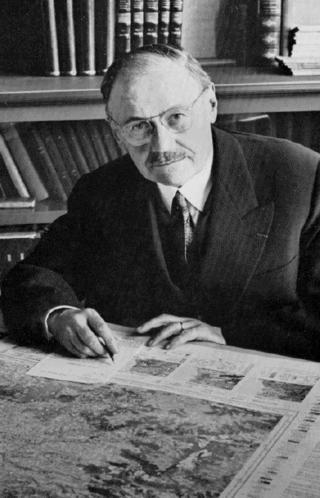
Marcel-Henri Gaussen, was a French botanist and biogeographer.
The Prix Renée Vivien is an annual French literary prize which is awarded to poets who write in French. Dedicated to the British poet Renée Vivien, the eponymous prize was first initiated in 1935, and continued intermittently by three different patrons, each with their own vision. First patron was Hélène de Zuylen de Nyevelt de Haar, followed by Natalie Clifford Barney in 1949 then more latterly and currently ongoing from 1994 with Claude Evrard. From each patron, the naming of the award after Renée Vivien was an act of remembrance. Nonetheless, women's poetry, feminist literature and the memories of romantic entanglement with the honoured poet have been inspiring on the first two patrons, who were more alike in their approach to awarding poets, while the heritage of Renée Vivien's style in contemporary poetry interested more Claude Evrard.

Michel Deguy was a French poet and translator.
Frédéric Jacques Temple was a French poet and writer. His work includes poems, novels, travel stories and essays.
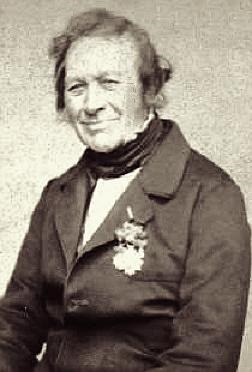
Louis Charles André Alexandre Du Mège or Dumège,, was a French scholar, archaeologist and historian.

François Paul Lachenal was a Swiss publisher and diplomat, who beginning in 1940 played a significant role in publishing the writings of the French authors during the occupation of France by Germany. He was member of the Swiss delegation in Vichy till 1944 and later till 1945 at the Swiss embassy in Berlin. Publisher of the magazine Traits he was son of Genevan politician Paul Lachenal, nephew of The president of the Swiss Confederation Adrien Lachenal and married to Johanna Bertha Caroline Otken. He is buried at the Cimetière des Rois in Geneva.
Paul Chamberland is a poet and Quebec essayist. He is also considered as a humanist. He studied philosophy and literature. He participated in La Nuit de La poésie in the 27th of March 1970, with Gaston Miron, Claude Péloquin, Raôul Duguay, Michèle Lalonde, etc.















